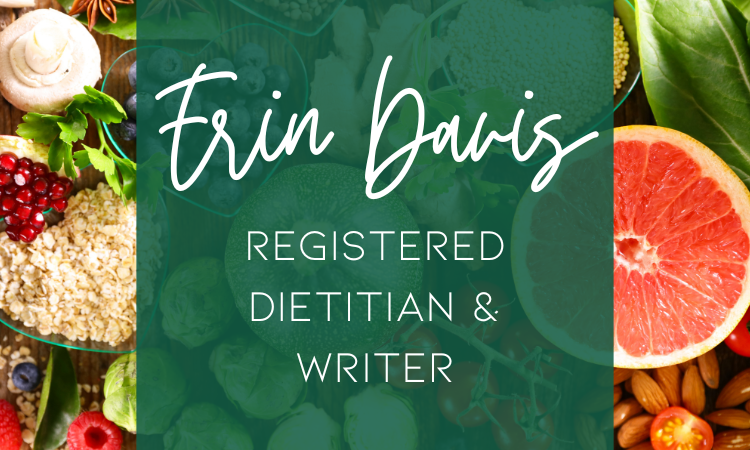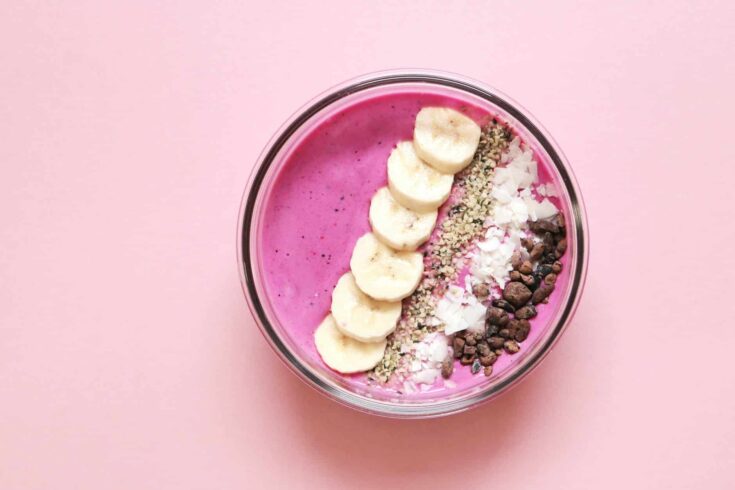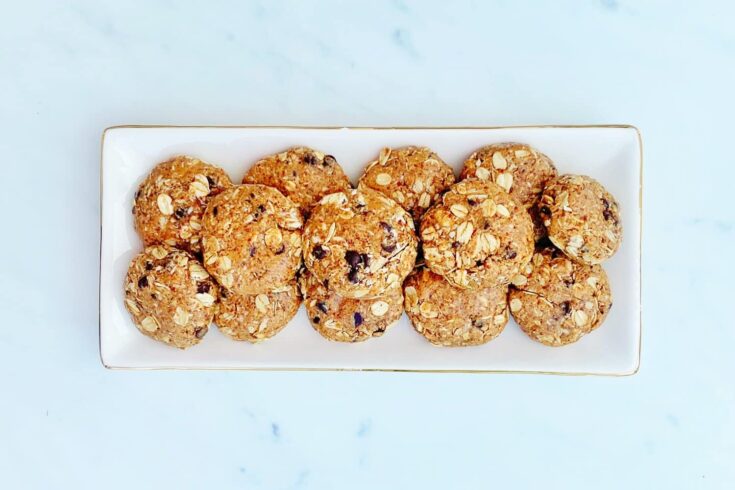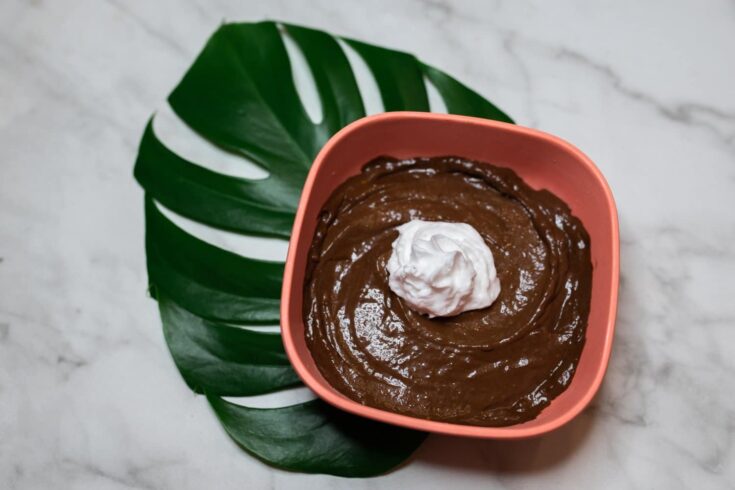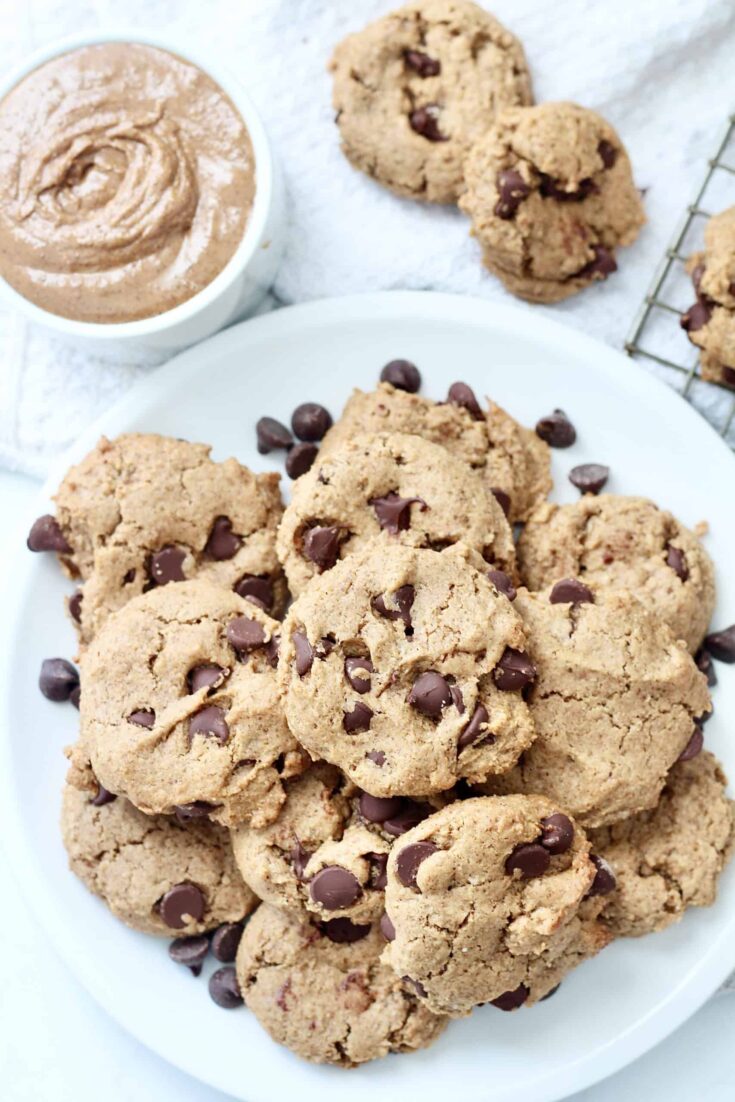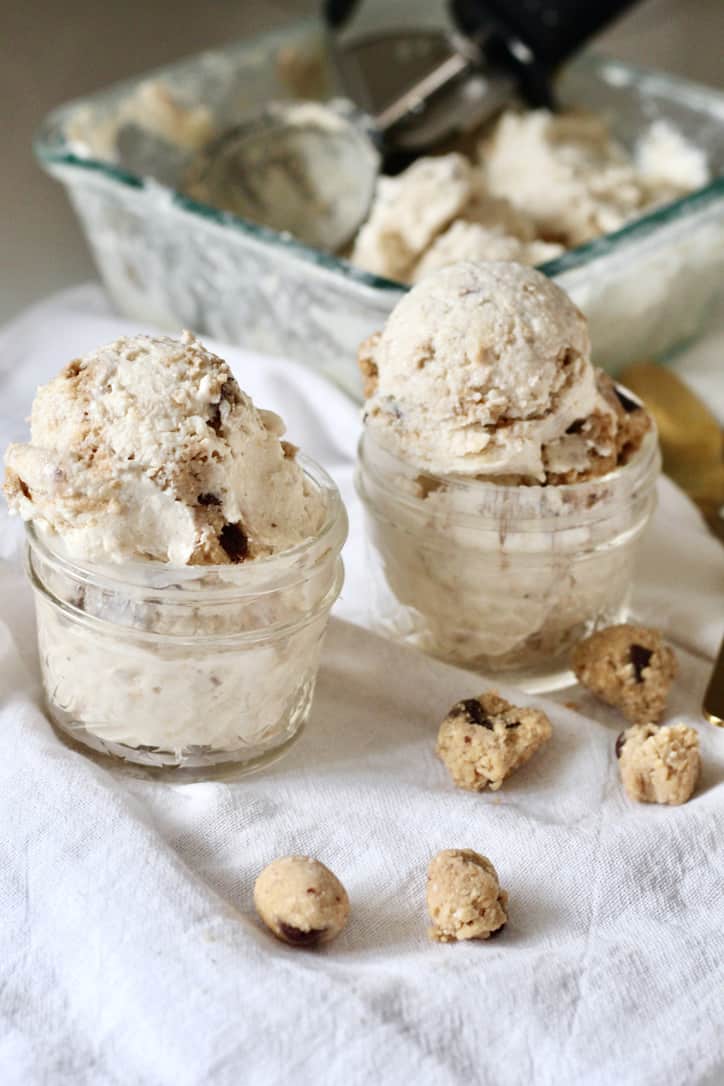You’re doing what you can to make sure your blood sugars are within target. But what if you have a sweet tooth? Are you allowed to eat a dessert when you have gestational diabetes? I’m here to tell you that you can! In today’s post, I’m talking about managing blood sugars AND enjoying your favorite sweets. And I’ve rounded up some delicious gestational diabetes desserts for you to try.
You find out you have gestational diabetes. Usually, you’re told to watch your diet and check your blood sugars. If you’re like most women, you’re now wondering what in the world you CAN eat.
Gestational diabetes can be tricky to navigate. But that doesn’t mean that certain foods are off-limits. In fact, you can enjoy almost all of the foods you ate before, but with a bit more intention.
I’m a firm believer in intuitive eating with diabetes. However, with gestational diabetes, we sometimes have to take a few more precautions.
Your blood sugar levels can impact the health of your baby. We use blood sugar metrics to guide eating a little more closely to prevent pregnancy complications.
If you’re new here, welcome! I’m Erin, an anti-diet dietitian who specializes in diabetes. There was a 3-year period in my career where I mainly supported only women diagnosed with gestational diabetes.
I learned there is no one more motivated than a pregnant woman. You are doing all that you can to make sure your baby is healthy and safe. And I want to help.
Here’s the thing: a diagnosis of gestational diabetes does not take away your sweet tooth. While you may be able to reduce your carb intake, chances are, you’ll still want a dessert now and then. Maybe everyday. I’m here to tell you that’s okay.
You can still eat dessert. I’ve found some dietitian-approved gestational diabetes desserts that have nourishing ingredients AND are lower in simple sugars.
Let’s dig in!
Please note: As an Amazon Associate, I earn from qualifying purchases.
- Why are blood sugars higher in pregnancy?
- Target blood sugar for gestational diabetes
- Can you still eat dessert if you have gestational diabetes?
- The best ingredients for a gestational diabetes dessert
- Should you have a bedtime snack?
- Are artificial sweeteners safe during pregnancy?
- No-prep gestational diabetes desserts
- Dietitian-approved gestational diabetes desserts recipes
Why are blood sugars higher in pregnancy?

I compare pregnancy and blood glucose to a hormonal storm. Sounds dramatic, but I want you to know that gestational diabetes ISN’T YOUR FAULT!
You’ve got the placental hormones ramping up to develop your baby. Then you have the hormone insulin trying to lower your sugar levels.
Add in your sleep and wake hormones, like melatonin and cortisol, and you have A LOT going on. This makes morning (fasting) blood sugars increase.
Furthermore, you may find it challenging to manage your glucose levels as your pregnancy goes on, and it’s no fault of your own.
Your body increased insulin demand in the last half of your pregnancy.
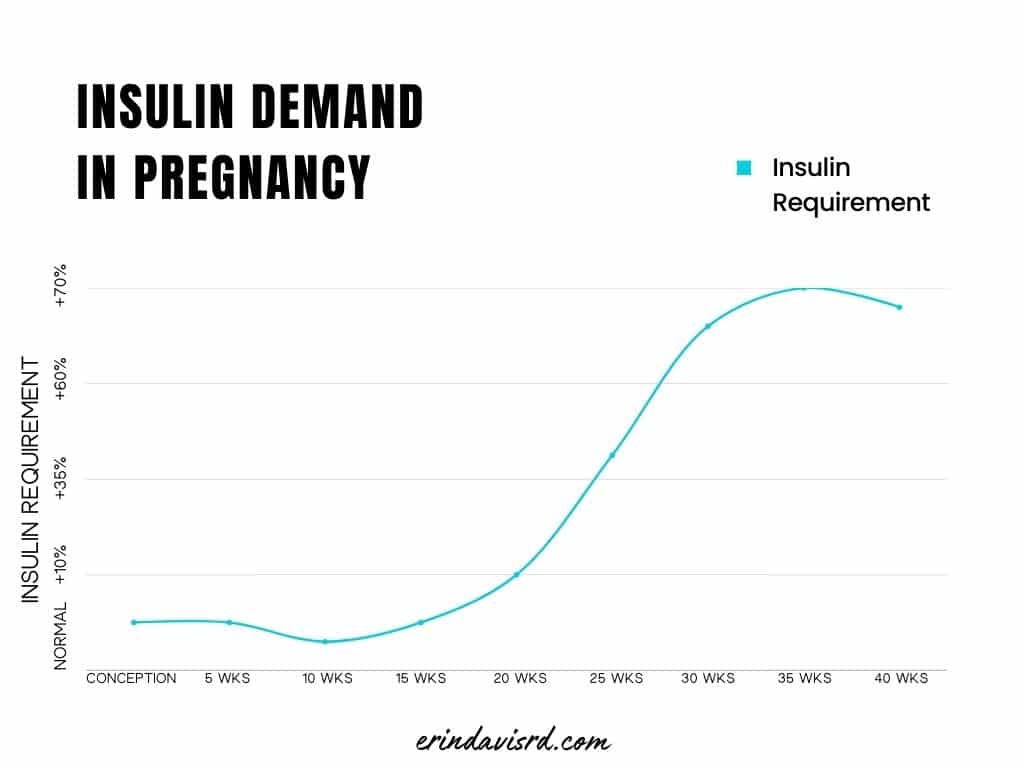
One of the main things my clients and I work on is letting go of the guilt. It’s typical to feel bad about a gestational diabetes diagnosis, like it was something you did, or didn’t do.
However, stressing about it isn’t going to help. I encourage you to look at it objectively. You’ve got gestational diabetes, and you are going to manage it. You got this!
Target blood sugar for gestational diabetes
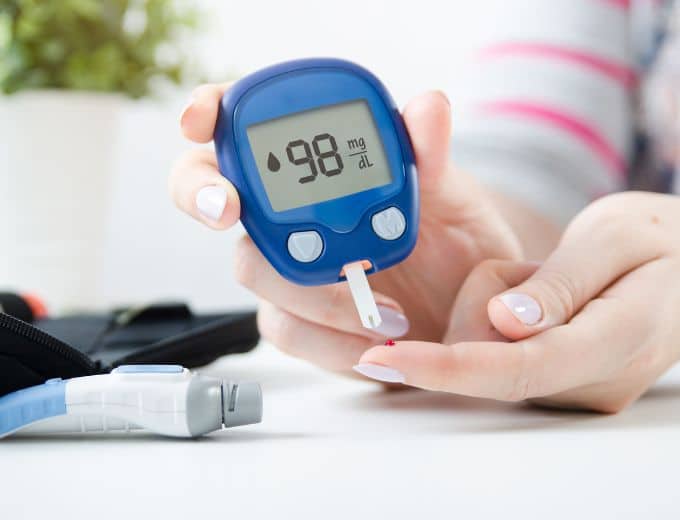
One of the first things you’ll receive when you are diagnosed with gestational diabetes is a blood glucose monitor, or glucometer. You are likely checking your fasting and post-meal blood sugar levels.
The targets are based on research to keep the baby safe and avoid complications. Recommendations for blood sugar levels during pregnancy include:
- Fasting blood sugar: taken when you wake up
- Target Range: Generally, a fasting blood sugar level <95 mg/dL (5.3 mmol/L) is considered normal.
- 1-hour post-meal: taken one hour after you’ve started your meal
- Target Range: <140 mg/dL
- 2-hour post-meal: taken two hours after the start of your meal
- Target Range: <120 mg/dL
Most providers like to see a record of your glucose levels. I have a printable log here if you need something to track your blood sugars.
Can you still eat dessert if you have gestational diabetes?

Yes! But when you eat it matters. You’ll use your blood glucose data to inform you when the best time for you is to eat dessert.
For example: Your post-lunch numbers are always below target because you take a walk after you eat. That’s the time to add in something sweet if you’d like.
If your numbers are always above target at dinner, I wouldn’t add a dessert after that meal. However, that doesn’t mean you can’t ever eat one.
You may be better off having one a couple of hours after the meal. Or before/after you’ve been active. Is there a meal you eat less carbs—a salad or a protein/veggie-based meal? Your numbers will help you figure it out.
Then, when you have your dessert, check your blood sugar 1-2 hours afterwards. Is it within target? If not, try a lower-carb option, or change the time when you have your dessert.
The best ingredients for a gestational diabetes dessert
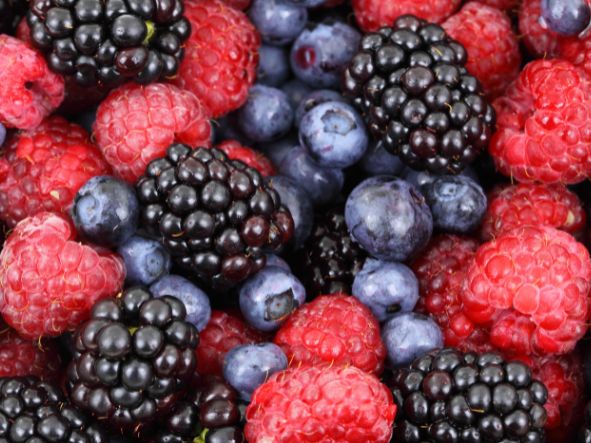
Of course, any time you eat is an opportunity to nourish you and your baby. You have greater nutritional needs during pregnancy for good reason.
You’re growing a human, after all. The best desserts are ones that satisfy you. But you can also find desserts that pack in some protein, fiber, vitamins, and minerals.
According to this review, some ingredients may be beneficial for a woman with gestational diabetes:
- Oats: The addition of oat bran can help reduce your blood sugars, so bring on the oats!
- Colorful fruits: Eating a variety of fruits, especially berries, will increase your intake of antioxidants
- Nuts and seeds: These plant-based sources of fat, vitamins, and minerals have been shown to be beneficial in reducing glucose levels in women with gestational diabetes.
- Complex carbs: CARBS ARE NOT THE ENEMY! Diets higher in complex carbs (whole grains, vegetables, and fruit) and lower in fat have been found to improve the gut health of both mom and baby.
Should you have a bedtime snack?

Often, bedtime snacks are recommended to avoid an overnight low and subsequent spike of blood sugar in the morning.
I usually recommend eating a snack if hunger disrupts your sleep, but it’s not a must. This is an area where intuitive eating comes in.
Unfortunately, I’ve had women who weren’t hungry at that time unnecessarily eating because it’s what they were told.
Research doesn’t overwhelmingly support the addition of a snack for the sole purpose of lowering fasting blood glucose. Plus, eating beyond your hunger will likely cause greater weight gain, which may further increase fasting blood sugars.
Are artificial sweeteners safe during pregnancy?
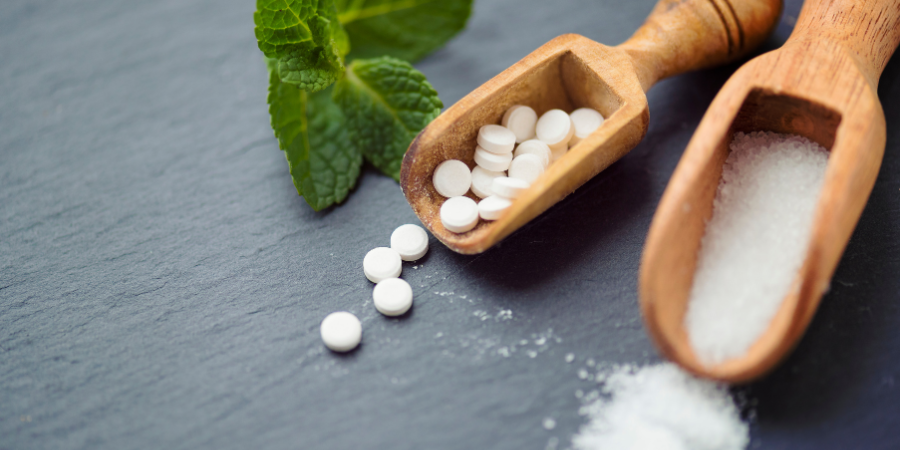
This is a common question I get from women looking to reduce their blood sugars. The answer depends on your comfort level.
Yes, the FDA has deemed some artificial sweeteners safe. But I personally prefer to err on the safe side when you are growing a baby.
We don’t know all there is to know about the impact long-term. For instance, newer studies show that artificial sweeteners change the makeup of the colostrum bacteria, potentially altering the infant gut bacteria.
High intakes of sugar and artificial sweeteners are linked to preterm birth, and the child’s preference for sugar later on.
Additionally, women who regularly consumed diet beverages had babies with higher BMIs.
It’s not fully understood and it’s a hot-topic of research. Currently, most health organizations consider artificial sweeteners safe for consumption. According to the American Pregnancy Association, the following is considered safe for pregnant women per the FDA:
- Stevia
- Acesulfame K
- Aspartame (Equal, NutraSweet)
- Sucralose (Splenda)

I do want to point out that artificial sweeteners are very sweet compared to sugar, so very small amounts are needed to achieve a sweet product. Because of this intensity, it takes A LOT to meet or exceed the acceptable daily intake.
No-prep gestational diabetes desserts
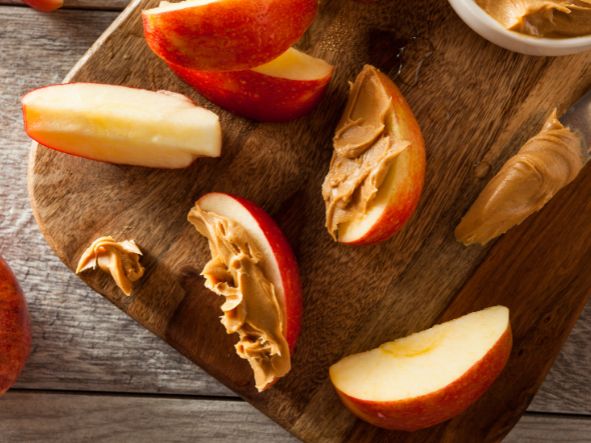
It’s not always possible for you to get in the kitchen to make yourself a dessert. Here are some ideas for some sweet treats that shouldn’t destroy your blood sugar levels:
- Berries (blackberries, raspberries, strawberries)
- Apple slices and peanut butter
- Apple Pie Oat Bites
- Chia Squeeze Pouch
- Fruit Smoothie Pouch
- Vanilla Almond RXBAR
- Brownie Snaps
- Soft and Chewy Cookies
- Cinnamon Coconut Crunch’Ems
- Toasted Pecan Cookies
- Dark Chocolate & Fig Truffles
- Dark Chocolate and Fruit Bars
- Dark Chocolate Peanut Butter Cups
Dietitian-approved gestational diabetes desserts recipes
If you’re looking for something to quell your sweet tooth, look no further. I’ve rounded up some dessert recipes for you to try. Major bonus—they’re all created by dietitians.
Gestational Diabetes Desserts
This cookie dough is safe to eat and adds some fiber and protein to your diet. Bonus—this healthy chickpea cookie dough is no bake, nut free, gluten free and made in under 5 minutes.
This apple and strawberry crisp is a must-try! The combination of sweet and tart from the fruit and the buttery crunch of the topping makes it the perfect dessert.
Almond flour is lower in carbs than wheat flour, yet still makes the most delicious cookies. Try these shortbread cookies for a tasty treat that is sure to please.
These soft and chewy healthy banana cookies are a delicious way to get your sweet fix with wholesome ingredients and no sugar added!
Looking for a refreshing ending to your meal? This Balsamic Macerated Strawberries and Cream recipe is the perfect dessert with a unique spin.
A refreshing dessert that's also good for the gut? Sign me up!
These no-bake options are ready in 10 minutes or less, bursting with health-promoting nutrients like fiber and plant-based protein.
Creamy, chocolatey, and loaded with healthy fat and prebiotic fiber, this dessert is sure to hit the spot.
Are you craving fruit like crazy? This is a fresh and light dessert that is easy to make.
White Chocolate Cranberry Oatmeal Cookies
Sweet, chewy, and good for you? This reduced-sugar cookie checks all the cravings boxes and is a source of dietary fiber.
Almond Butter Chocolate Chip Cookies (Gluten-Free)
Not only are these cookies amazingly delicious, but they also have 3g of protein in each cookie.
Cookie Dough Homemade Low Carb Frozen Yogurt
Looking for a low-carb ice cream that will satisfy your post-meal sweets craving? This recipe is just the thing!
These cookies are straightforward to make and take less than 5 minute to throw together. Each cookie contains 6 grams of protein and they are relatively low in carbohydrates as well with only 13 grams per cookie.
Amazing, flour-less Black Bean Brownies are chocolatey, moist, and delicious! These are NOT the mediocre bean-based brownies you've tried in the past.
Finally, if you’re feeling a bit lost or overwhelmed while trying to get your blood sugars down, you don’t have to go it alone. I am here to help.
If you’d like to meet to discuss how you can structure your meals and desserts AND hit your glucose targets, book an appointment. I am currently seeing clients on Nourish and can meet with you to discuss about your health goals and come up with a support plan.
Disclaimer: This information is intended as a self-help tool for your own use, at your own risk. My opinions do not reflect the values, thoughts, or opinions of the Academy of Nutrition and Dietetics or other professional health organizations.
References:
- Kampmann, Ulla & Knorr, Sine & Fuglsang, Jens & Ovesen, Per. (2019). Determinants of Maternal Insulin Resistance during Pregnancy: An Updated Overview. Journal of Diabetes Research. 2019. 1-9. 10.1155/2019/5320156.
- Sánchez-García JC, Saraceno López-Palop I, Piqueras-Sola B, et al. Advancements in Nutritional Strategies for Gestational Diabetes Management: A Systematic Review of Recent Evidence. J Clin Med. 2023;13(1):37. Published 2023 Dec 20. doi:10.3390/jcm13010037
- Barati Z, Iravani M, Karandish M, Haghighizadeh MH, Masihi S. The effect of oat bran consumption on gestational diabetes: a randomized controlled clinical trial. BMC Endocr Disord. 2021;21(1):67. Published 2021 Apr 13. doi:10.1186/s12902-021-00731-8
- Jaworsky K, DeVillez P, Alexander JM, Basu A. Effects of an Eating Pattern Including Colorful Fruits and Vegetables on Management of Gestational Diabetes: A Randomized Controlled Trial. Nutrients. 2023;15(16):3624. Published 2023 Aug 18. doi:10.3390/nu15163624
- Jaworsky K, DeVillez P, Basu A. The Role of Phytochemicals and Plant-Based Diets in Gestational Diabetes: Evidence from Clinical Trials. Int J Environ Res Public Health. 2023;20(5):4188. Published 2023 Feb 26. Sugino KY, Hernandez TL, Barbour LA, Kofonow JM, Frank DN, Friedman JE. A maternal higher-complex carbohydrate diet increases bifidobacteria and alters early life acquisition of the infant microbiome in women with gestational diabetes mellitus. Front Endocrinol (Lausanne). 2022;13:921464. Published 2022 Jul 28. doi:10.3389/fendo.2022.921464doi:10.3390/ijerph20054188
- Renault KM, Carlsen EM, Nørgaard K, et al. Intake of carbohydrates during pregnancy in obese women is associated with fat mass in the newborn offspring. Am J Clin Nutr. 2015;102(6):1475-1481. doi:10.3945/ajcn.115.110551
- Henze M, Burbidge H, Nathan E, Graham DF. The effect of bedtime snacks on fasting blood glucose levels in gestational diabetes mellitus. Diabet Med. 2022;39(3):e14718. doi:10.1111/dme.14718
- Goran MI, Plows JF, Ventura EE. Effects of consuming sugars and alternative sweeteners during pregnancy on maternal and child health: evidence for a secondhand sugar effect. Proc Nutr Soc. 2019;78(3):262-271. doi:10.1017/S002966511800263X
- Tapia-González A, Vélez-Ixta JM, Bueno-Hernández N, et al. Maternal Consumption of Non-Nutritive Sweeteners during Pregnancy Is Associated with Alterations in the Colostrum Microbiota. Nutrients. 2023;15(23):4928. Published 2023 Nov 26. doi:10.3390/nu15234928
- Azad MB, Sharma AK, de Souza RJ, et al. Association Between Artificially Sweetened Beverage Consumption During Pregnancy and Infant Body Mass Index. JAMA Pediatr. 2016;170(7):662-670. doi:10.1001/jamapediatrics.2016.0301
About the author
Erin is a registered dietitian and diabetes educator with almost 20 years of experience. She specializes in weight-inclusive diabetes care and prevention, intuitive eating, fitness, and women’s health. She works as a consultant and writer in the health and wellness space. Erin is passionate about empowering people to manage their own health and to have peace with food.
